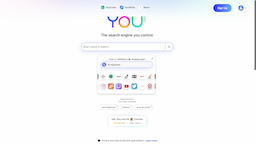User's Area

You
Search engine with customizable results.
What is You?
Search Engine You Can Manage
In today's digital age, search engines undoubtedly play an essential role in our everyday lives. From accessing information to finding products and services, search engines are the go-to tools for millions of people worldwide. However, as the internet continues to grow, users are becoming increasingly concerned about the potential bias, privacy issues, and lack of transparency in the search results they receive. Fortunately, there are steps you can take to regain control and ensure a more personalized and reliable search experience.
Personalization and Customization
One of the key features of a search engine that you can control is the ability to personalize and customize your search results. By providing the option to filter and tailor your search preferences, you can ensure that the information presented to you is relevant and valuable. Whether it's adjusting search settings, creating custom filters, or selecting preferred sources, having control over your search parameters can greatly enhance your browsing experience.
Privacy and Data Security
In an era where data privacy and security are major concerns, having a search engine that prioritizes these aspects is crucial. By allowing users to manage and protect their personal information, such as search history, cookies, and location data, you can feel more confident in your online activities. Additionally, the ability to opt-out of targeted advertising and prevent third-party tracking can contribute to a more private and secure search experience.
Transparency and Accountability
Another important aspect of a search engine you can manage is transparency and accountability. Users want to know how search results are generated, what factors influence rankings, and how their data is used. A search engine that provides clear and detailed information about its algorithms, data practices, and content policies can build trust and credibility with its users. Furthermore, having mechanisms in place for reporting and addressing misleading or harmful content can contribute to a more transparent and accountable search environment.
Accessibility and Inclusivity
A user-controlled search engine should also prioritize accessibility and inclusivity. This means offering tools and features that cater to diverse user needs, such as language preferences, voice search capabilities, and accessible design for users with disabilities. By ensuring that all users can navigate and interact with the search engine in a way that suits their individual requirements, the platform becomes more inclusive and user-friendly.
Empowerment and Empathy
Ultimately, a search engine you can control should empower and empathize with its users. This entails providing educational resources, support channels, and proactive communication to help users make informed decisions and navigate the search landscape more effectively. Additionally, empathetic design elements that prioritize user well-being and mental health can foster a more positive and supportive search environment.
In conclusion, a search engine that prioritizes personalization, privacy, transparency, accessibility, and empathy can offer a more user-centric and empowering experience. By putting the user in control of their search journey, these platforms can not only meet the diverse needs of their users but also foster trust, confidence, and a sense of ownership in the search process. As technology continues to evolve, the importance of user-controlled search engines will only grow, guiding the way for a more personalized and empowering digital future.